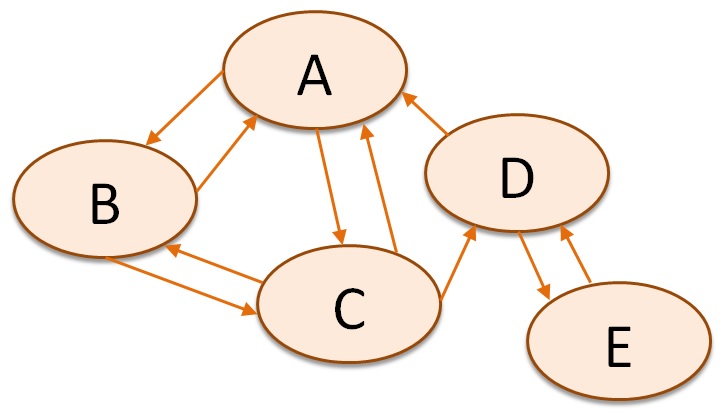|
Informetrics
Informetrics is the study of quantitative aspects of information, it is an extension and evolution of traditional bibliometrics and scientometrics. Informetrics uses bibliometrics and scientometrics methods to study mainly the problems of literature information management and evaluation of science and technology. Informetrics is an independent discipline that uses quantitative methods from mathematics and statistics to study the process, phenomena, and law of informetrics. Informetrics has gained more attention as it is a common scientific method for academic evaluation, research hotspots in discipline, and trend analysis. Informetrics includes the production, dissemination, and use of all forms of information, regardless of its form or origin. Informetrics encompasses the following fields: * Scientometrics, which studies quantitative aspects of science * Webometrics, which studies quantitative aspects of the World Wide Web * Bibliometrics, which studies quantitative aspects of ' ... [...More Info...] [...Related Items...] OR: [Wikipedia] [Google] [Baidu] |
Ronald Rousseau
Ronald Rousseau ( Antwerp, 1949) is a Belgian mathematician and information scientist. He has obtained an international reputation for his research on indicators and citation analysis in the fields of bibliometrics and scientometrics. Education and career Ronald Rousseau obtained his doctorate in mathematics at the KU Leuven in 1977 and his doctorate in documentation and library science at the UIA in 1992. He was Professor of Mathematics at the Department of Industrial Science and Technology at the KHBO in Ostend, Belgium. Rousseau has focused his research on the development and use of indicators to measure the quality of research and main trends in science. He is an expert in citation analysis and research evaluation. In 1990 Ronald Rousseau and Leo Egghe wrote the first manual of bibliometrics. Rousseau has published more than 200 scientific articles on various aspects of bibliometrics and scientometrics in, among other journals, Scientometrics, Journal of the American ... [...More Info...] [...Related Items...] OR: [Wikipedia] [Google] [Baidu] |
Webometrics
The science of webometrics (also cybermetrics) tries to measure the World Wide Web to get knowledge about the number and types of hyperlinks, structure of the World Wide Web and using patterns. According to Björneborn and Ingwersen, the definition of webometrics is "the study of the quantitative aspects of the construction and use of information resources, structures and technologies on the Web drawing on bibliometric and informetric approaches." The term ''webometrics'' was first coined by Almind and Ingwersen (1997). A second definition of webometrics has also been introduced, "the study of web-based content with primarily quantitative methods for social science research goals using techniques that are not specific to one field of study", which emphasizes the development of applied methods for use in the wider social sciences. The purpose of this alternative definition was to help publicize appropriate methods outside of the information science discipline rather than to replace ... [...More Info...] [...Related Items...] OR: [Wikipedia] [Google] [Baidu] |
Webometrics
The science of webometrics (also cybermetrics) tries to measure the World Wide Web to get knowledge about the number and types of hyperlinks, structure of the World Wide Web and using patterns. According to Björneborn and Ingwersen, the definition of webometrics is "the study of the quantitative aspects of the construction and use of information resources, structures and technologies on the Web drawing on bibliometric and informetric approaches." The term ''webometrics'' was first coined by Almind and Ingwersen (1997). A second definition of webometrics has also been introduced, "the study of web-based content with primarily quantitative methods for social science research goals using techniques that are not specific to one field of study", which emphasizes the development of applied methods for use in the wider social sciences. The purpose of this alternative definition was to help publicize appropriate methods outside of the information science discipline rather than to replace ... [...More Info...] [...Related Items...] OR: [Wikipedia] [Google] [Baidu] |
Scientometrics
Scientometrics is the field of study which concerns itself with measuring and analysing scholarly literature. Scientometrics is a sub-field of informetrics. Major research issues include the measurement of the impact of research papers and academic journals, the understanding of scientific citations, and the use of such measurements in policy and management contexts. Leydesdorff, L. and Milojevic, S., "ScientometricsarXiv:1208.4566(2013), forthcoming in: Lynch, M. (editor), ''International Encyclopedia of Social and Behavioral Sciences'' subsection 85030. (2015) In practice there is a significant overlap between scientometrics and other scientific fields such as information systems, information science, science of science policy, sociology of science, and metascience. Critics have argued that over-reliance on scientometrics has created a system of perverse incentives, producing a publish or perish environment that leads to low-quality research. Historical development Modern ... [...More Info...] [...Related Items...] OR: [Wikipedia] [Google] [Baidu] |
Quantitative Analysis (finance)
Quantitative analysis is the use of mathematical and statistical methods in finance and investment management. Those working in the field are quantitative analysts (quants). Quants tend to specialize in specific areas which may include derivative structuring or pricing, risk management, investment management and other related finance occupations. The occupation is similar to those in industrial mathematics in other industries. The process usually consists of searching vast databases for patterns, such as correlations among liquid assets or price-movement patterns ( trend following or mean reversion). Although the original quantitative analysts were " sell side quants" from market maker firms, concerned with derivatives pricing and risk management, the meaning of the term has expanded over time to include those individuals involved in almost any application of mathematical finance, including the buy side. Applied quantitative analysis is commonly associated with quantitative i ... [...More Info...] [...Related Items...] OR: [Wikipedia] [Google] [Baidu] |
Robert K
The name Robert is an ancient Germanic given name, from Proto-Germanic "fame" and "bright" (''Hrōþiberhtaz''). Compare Old Dutch ''Robrecht'' and Old High German ''Hrodebert'' (a compound of '' Hruod'' ( non, Hróðr) "fame, glory, honour, praise, renown" and ''berht'' "bright, light, shining"). It is the second most frequently used given name of ancient Germanic origin. It is also in use as a surname. Another commonly used form of the name is Rupert. After becoming widely used in Continental Europe it entered England in its Old French form ''Robert'', where an Old English cognate form (''Hrēodbēorht'', ''Hrodberht'', ''Hrēodbēorð'', ''Hrœdbœrð'', ''Hrœdberð'', ''Hrōðberχtŕ'') had existed before the Norman Conquest. The feminine version is Roberta. The Italian, Portuguese, and Spanish form is Roberto. Robert is also a common name in many Germanic languages, including English, German, Dutch, Norwegian, Swedish, Scots, Danish, and Icelandic. It can be ... [...More Info...] [...Related Items...] OR: [Wikipedia] [Google] [Baidu] |
Alan Pritchard
Alan Stewart Pritchard (born 24 August 1943) is an English footballer, who played as an inside forward in the Football League The English Football League (EFL) is a league of professional association football, football clubs from England and Wales. Founded in 1888 as the Football League, the league is the oldest such competition in Association football around the wor ... for Chester City. References Chester City F.C. players Ellesmere Port Town F.C. players Association football inside forwards English Football League players Living people 1943 births People from Chester English footballers {{England-footy-forward-1940s-stub ... [...More Info...] [...Related Items...] OR: [Wikipedia] [Google] [Baidu] |
Tibor Braun
Tibor is a masculine given name found throughout Europe. There are several explanations for the origin of the name: * from Latin name Tiberius, which means "from Tiber", Tiber being a river in Rome. * in old Slavic languages, Tibor means "sacred place". * shortened form of the name ''Tiborc''; which originates from the ancient Latin surname Tiburtius. * from Etruscan name Tibur, which means "honest man" Some notable men known by this name include: * Tibor Antalpéter * Tibor Benedek * Tibor Farkas * Tibor Feheregyhazi * Tibor Fischer * Tibor Gécsek * Tibor Hollo * Tibor Kalman * Tibor R. Machan * Tibor Mičinec * Tibor Nyilasi * Tibor Ordina * Tibor Parák * Tibor Pleiß * Tibor Radó * Tibor Renyi * Tibor Selymes * Tibor Stark * Tibor Szasz * Tibor Szele * Tibor Varga (ice hockey) * Tibor Varga (violinist) * Tibor Zsitvay See also * Ctibor (name) * ''Tibor'' is the Hungarian name for Tibru village, Cricău Commune, Alba County, Romania * TIBOR Tibor is a masculine gi ... [...More Info...] [...Related Items...] OR: [Wikipedia] [Google] [Baidu] |
Metascience
Metascience (also known as meta-research) is the use of scientific methodology to study science itself. Metascience seeks to increase the quality of scientific research while reducing inefficiency. It is also known as "''research on research''" and "''the science of science''", as it uses research methods to study how research is done and find where improvements can be made. Metascience concerns itself with all fields of research and has been described as "a bird's eye view of science". In the words of John Ioannidis, "Science is the best thing that has happened to human beings ... but we can do it better." In 1966, an early meta-research paper examined the statistical methods of 295 papers published in ten high-profile medical journals. It found that "in almost 73% of the reports read ... conclusions were drawn when the justification for these conclusions was invalid." Meta-research in the following decades found many methodological flaws, inefficiencies, and poor practices in ... [...More Info...] [...Related Items...] OR: [Wikipedia] [Google] [Baidu] |
Philology
Philology () is the study of language in oral and written historical sources; it is the intersection of textual criticism, literary criticism, history, and linguistics (with especially strong ties to etymology). Philology is also defined as the study of literary texts as well as oral and written records, the establishment of their authenticity and their original form, and the determination of their meaning. A person who pursues this kind of study is known as a philologist. In older usage, especially British, philology is more general, covering comparative and historical linguistics. Classical philology studies classical languages. Classical philology principally originated from the Library of Pergamum and the Library of Alexandria around the fourth century BC, continued by Greeks and Romans throughout the Roman/Byzantine Empire. It was eventually resumed by European scholars of the Renaissance, where it was soon joined by philologies of other European ( Germanic, Celtic), Eur ... [...More Info...] [...Related Items...] OR: [Wikipedia] [Google] [Baidu] |
Early Modern Britain
Early modern Britain is the history of the island of Great Britain roughly corresponding to the 16th, 17th and 18th centuries. Major historical events in early modern British history include numerous wars, especially with France, along with the English Renaissance, the English Reformation and Scottish Reformation, the English Civil War, the Restoration of Charles II, the Glorious Revolution, the Treaty of Union, the Scottish Enlightenment and the formation and the collapse of the First British Empire. England during the Tudor period (1486–1603) English Renaissance The term, "English Renaissance" is used by many historians to refer to a cultural movement in England in the 16th and 17th centuries that was heavily influenced by the Italian Renaissance. This movement is characterised by the flowering of English music (particularly the English adoption and development of the madrigal), notable achievements in drama (by William Shakespeare, Christopher Marlowe, and Ben Jonson ... [...More Info...] [...Related Items...] OR: [Wikipedia] [Google] [Baidu] |



